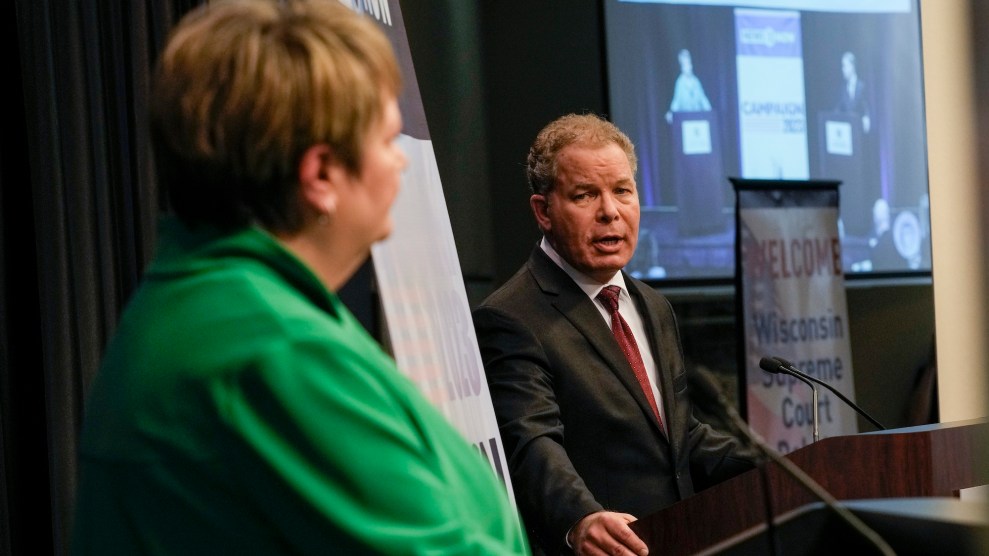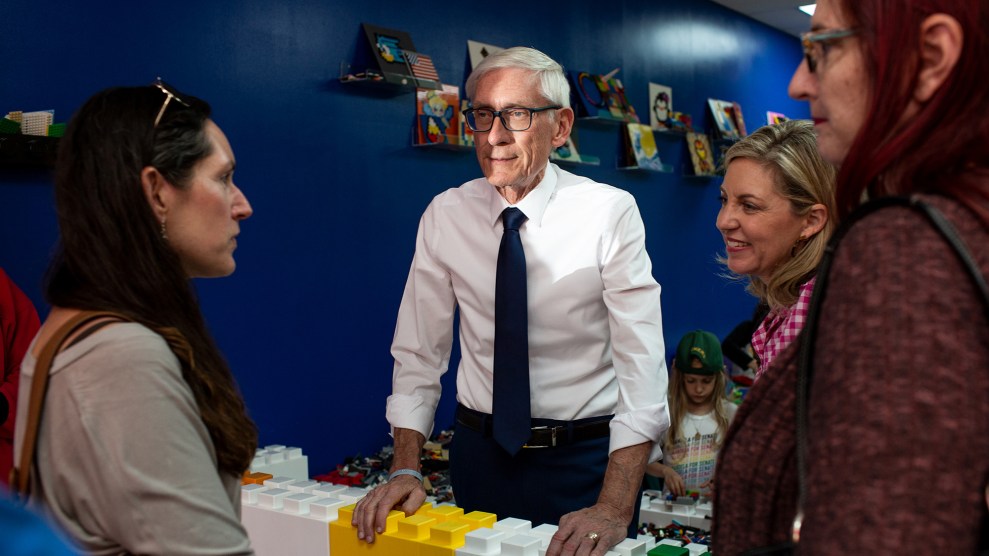On December 12, 2020—a day after the US Supreme Court rejected a lawsuit filed by Texas that sought to void the presidential election results in Georgia, Michigan, Pennsylvania, and Wisconsin—the Wisconsin Supreme Court heard a separate challenge by Donald Trump’s campaign that aimed to throw out 221,000 votes cast in the state’s two most Democratic counties, containing the cities of Madison and Milwaukee. It was the only state Supreme Court in the country to hold a hearing on Trump’s effort to overturn the election.
Despite Trump’s overwhelming losses in state and federal court, he came remarkably close to reversing Joe Biden’s 20,000 vote margin of victory in Wisconsin. Two days after it heard oral arguments—as electors across the country met to certify Biden’s win—the Wisconsin Supreme Court narrowly rejected Trump’s petition by a vote of 4-3, with three conservative justices dissenting. The lawsuit only failed because conservative swing justice Brian Hagedorn sided with the court’s three liberal justices. “Striking these votes now—after the election, and in only two of Wisconsin’s 72 counties when the disputed practices were followed by hundreds of thousands of absentee voters statewide—would be an extraordinary step for this court to take,” he wrote for the majority. “We will not do so.”
But if Daniel Kelly, a former conservative justice who criticized Hagedorn as “supremely unreliable” and was defeated by a liberal justice in April 2020, had still been on the Wisconsin Supreme Court, Trump’s effort to overturn the election in Wisconsin likely would have succeeded, plunging the state and the nation into a constitutional crisis. Now Kelly is running again for his old job against Janet Protasiewicz, a progressive judge in Milwaukee County, in a critical election on Tuesday that will determine the balance of power on the court. (State Supreme Court justices are elected in Wisconsin and though the races are officially nonpartisan, candidates tend to associate with one party or another).
The election, which has been called the most important of 2023, has huge stakes for the state—and for national politics as well. If Protasiewicz wins, that will give progressives their first majority on the court since 2008 and their best—and perhaps only—chance to roll back the GOP’s decade-plus efforts to undermine democracy in the state, like the heavily gerrymandered maps that have locked in enormous Republican majorities in the legislature and a series of laws that have made it harder to vote. The court could also strike down hugely unpopular policies that the GOP-controlled legislature refuses to change, like a criminal abortion ban from 1849 that immediately took effect after the US Supreme Court overturned Roe v. Wade. “The reason I decided to run was really very simple—I thought our democracy was in peril,” Protasiewicz said in a debate last month with Kelly. On the other hand, if Kelly wins, it will cement the GOP’s anti-democratic takeover of the Badger State and make it virtually impossible to reverse.
Protasiewicz, who won more votes in the nonpartisan primary than the two conservative candidates combined, is considered a slight favorite, despite the barrage of dark-money spending against her. But the race is expected to be close and it’s unclear if Trump’s indictment in New York will boost Republican votes in an otherwise low-turnout election. The cost of the election has already topped $45 million, tripling the record for a state Supreme Court contest. Protasiewicz has significantly outspent Kelly’s campaign, but outside conservative groups have outpaced liberal ones.
Kelly, who was endorsed by Trump in 2020, consulted with Republicans on another strategy to nullify Biden’s victory. Former Wisconsin GOP chair Andrew Hitt told the January 6 committee that he had “extensive conversations” with Kelly, who was paid over $120,000 to advise the party on “election law matters,” about a last-ditch effort to approve a slate of alternate electors for Trump that would have overturned the choice of Wisconsin’s voters. Sen. Ron Johnson (R-Wisc.) attempted to give that slate of fake electors on January 6 to Vice President Mike Pence, who rejected Trump’s lobbying not to certify the Electoral College votes. Protasiewicz calls Kelly “probably one of the most extreme partisan characters in the history of this state” and “a true threat to our democracy.”
The Wisconsin Supreme Court has been a key driver of GOP efforts to make their majorities voter-proof and turn the state into what Ben Wikler, chair of the Wisconsin Democratic Party, calls “a democracy-free zone.” The court’s conservative majority has upheld nearly every move by the Republican-dominated legislature to entrench its power—including the state GOP’s heavily gerrymandered maps, attacks on voting rights, dismantling of the state’s campaign-finance laws, and repeal of collective bargaining rights for unions. These anti-democratic moves began when Gov. Scott Walker and the Republican legislature took over the state in 2011 and accelerated when the legislature stripped power from Democratic Gov. Tony Evers in an unprecedented lame-duck session after he defeated Walker in 2018, a Republican gambit that was largely upheld by the court. (Hagedorn, despite voting against Trump’s challenge to the election, has usually sided with the other conservative justices.)
By systemically limiting the influence of Democratic constituencies, GOP lawmakers have not only given themselves more power, but they have made it easier for conservatives to maintain their majority on the court, creating an almost-impenetrable anti-democracy feedback loop in one of the country’s most important battleground states. “Right now, the state Supreme Court is an extension of the Republican legislature,” Wikler told me after the 2022 election.
Though Republicans and Republican-backed candidates have lost 13 of the last 16 statewide elections, Democrats and progressives have no way to change policy in the state. The GOP-controlled legislature’s stranglehold on power—augmented by its allies on the bench—allows it to ignore popular sentiment and maintain unpopular policies like the state’s recently-imposed abortion ban while refusing to pass hugely popular policies, such as background checks for guns and expanding Medicaid.
The election on Tuesday will likely decide the future of redistricting, voting laws, and abortion rights in the state. On a deeper level, it will determine whether Wisconsin restores majority rule, meaningful checks and balances, and begins what Wikler calls “a new era of democracy”—or whether it continues to be a laboratory for testing new ways to undermine democracy that are replicated by Republicans across the country.

The gerrymandered maps passed by Republicans in 2011 have been the most important factor in the GOP’s undemocratic grip on power. Drawn in secret at a private law firm across the street from the state capitol, the maps gave Republicans a huge majority of seats even when they received a minority of votes statewide. Kelly, then a lawyer in private practice, defended the GOP redistricting effort in federal court.
Republicans used those skewed maps as the template for the new maps they drew in 2021 to preserve and expand their majorities, with legislative Republicans saying they wanted to “retain as much as possible the core of existing districts”—as if the heavily gerrymandered maps had existed for decades.
When Gov. Evers introduced his own maps—which contained more competitive districts and more accurately reflected the state’s demographics and fifty-fifty political composition—the conservative majority on the Wisconsin Supreme Court sided with the GOP legislature, which had passed a dueling set of maps. The conservative justices took control of the redistricting process from the federal courts and ruled that the Wisconsin Supreme Court would choose the state legislative and congressional maps that made the “least changes” from the 2011 maps, which virtually ensured that the new lines would be heavily stacked in the GOP’s favor
The strategy worked as intended. In 2022, Evers was reelected with 51 percent of the vote and Democrats won 4 of 6 statewide elections, but Republicans retained 67 percent of state Senate seats and 65 percent of Assembly seats. They attained a supermajority in the senate and came just two seats short of gaining a supermajority in the assembly, which would have allowed Republicans to overrule the governor’s vetoes and make him functionally irrelevant. As I reported before the election, under the new lines, Democrats have to win the statewide vote by 12 points just to get to 50 seats in the Assembly, while Republicans can garner a majority with only 44 percent of the vote, according to calculations by Marquette University Law School research fellow John Johnson. “The brutal efficiency of Republican gerrymandering here is the fundamental political truth of Wisconsin politics,” Wikler said in November. “The state is not a democracy as long as these maps are in place.”
GOP assembly leader Robin Vos admitted, during the legislature’s only public hearing on the maps in October 2021, that the “least change” requirement was “not in the [Wisconsin] Constitution” and that the new lines were passed for partisan purposes.
Protasiewicz, who served for more than 25 years as an assistant district attorney in the Milwaukee area before being elected as a judge in 2014, has been notably outspoken for a judicial candidate and sharply critical of gerrymandering in the state. “Let’s be clear here: the maps are rigged,” she said at a candidate forum in January. “Absolutely, positively rigged. They do not reflect the people in the state.”
And she’s taken exception to the “least changes” criteria adopted by Republicans. “That methodology is totally unfair,” she said in a debate last month. “We are a representative democracy. Everybody’s vote should count. And with this ‘least change’ rule, everybody’s vote is not counting.”
A Protasiewicz victory would give progressive groups the opening they’ve lacked to file a new challenge to the maps. “A question that hasn’t been answered yet and should be answered is what the Wisconsin Constitution says about gerrymandering,” says Dan Lenz, staff counsel at Law Forward, a progressive legal group in the state.
Lenz notes that the Wisconsin Constitution contains protections for voting rights that are not included in the federal constitution and other provisions, such as language stating that “the blessings of a free government can only be maintained by a firm adherence to justice [and] moderation,” that could be used to challenge partisan gerrymandering.
“Can you truly say you’re being governed by the consent of the governed under this level of gerrymandering?” he asks.
Legislative Republicans are already floating extreme measures to neutralize Protasiewicz’s power if she wins.
Republican State Rep. Dan Knodl, who is running in a special election on Tuesday to fill a vacant state senate in suburban Milwaukee that will determine whether the GOP maintains a two-thirds supermajority in the body, has floated the idea of impeaching Protasiewicz. He claims that the “Milwaukee County justice system is failing” and that he would “certainly consider” supporting impeachment proceedings against Protasiewicz and other Milwaukee officials. (It’s unclear how Knodl and the GOP legislature could remove Protasiewicz from the state Supreme Court for work she did in a prior office in Milwaukee.)
Knodl was one of 15 state legislators in Wisconsin who sent a letter to Vice President Mike Pence before January 6 urging him not to certify the state’s electoral votes. The senate seat he is running for has been trending blue as the suburbs move away from the GOP, but Republicans shifted it from a 7.5 percent Republican advantage to a 12.5 percent Republican advantage under the new lines to protect their supermajority.
Even by the standards of the GOP legislature, impeaching Protasiewicz would represent a breathtaking abuse of power. “That would be an incredible power seizure, amounting to a coup by the legislature if they were to overturn a statewide election based on nothing,” Lenz says. “Impeachment requires a certain level of misconduct. I don’t think there’s been any accusation that Judge Protasiewicz has engaged in any kind of misconduct, and she hasn’t even been elected to the Wisconsin Supreme Court yet.” (The Wisconsin Constitution requires evidence of “corrupt conduct in office or crimes and misdemeanors” for impeachment.)
Then there’s the threat posed by the US Supreme Court, which is set to rule in the coming months on a case in which Republicans are arguing that state legislatures should have exclusive power to draw redistricting maps and pass voting rules. Such a ruling, which would eviscerate checks and balances in state politics, could prevent the Wisconsin Supreme Court from striking down the state’s congressional map—where Republicans have a 6 to 2 advantage in seats—and rolling back laws making it harder to vote.
In 2019, the US Supreme Court explicitly said that partisan gerrymandering could only be challenged in state courts. It would be quite extraordinary for the court’s conservative majority to turn around just a few years later and say that state courts can no longer rein in rigged maps passed by state legislatures, especially if progressives finally gain a majority on the high court in Wisconsin.

Kelly is deeply enmeshed in the conservative movement. He’s a former president of the Milwaukee chapter of the Federalist Society and has worked for the Bradley Foundation, which has funded many of the groups behind the state’s GOP takeover, as well as national organizations that have promoted the Big Lie. Even by the standards of conservative judges these days, Kelly’s views are extreme. He’s called Medicare and Medicaid forms of “involuntary servitude,” said that gay marriage “will eventually rob the institution of marriage of any discernible meaning,” compared affirmative action to the moral equivalent of slavery, and argued that abortion is “a policy that has as its primary purpose harming children.” After being appointed to the Wisconsin Supreme Court by Scott Walker in 2016 to fill a vacancy of a retiring conservative justice, his first opinion barred the city of Madison from prohibiting loaded guns on public buses.
Most notably, he’s closely allied with the Republicans who tried to subvert democracy and free and fair elections in 2020 and 2022.
Kelly was one of the featured speakers on the Wisconsin Republican Party’s nine-city “Election Integrity Roundtable” tour before the 2022 midterms that Democratic state Rep. Mark Spreitzer called a “conspiracy theory roadshow.”
Kelly’s largest outside donor has been the far-right megadonor Richard Uihlein, an Illinois-based shipping magnate who was one of the largest backers of the “Save America” rally that preceded the insurrection and who has funded scores of candidates and groups promoting election denialism. Uihlein was the GOP’s biggest donor in 2022—and 80 percent of his contributions went to Republicans who denied or questioned the 2020 election results
At least five political action committees supporting Kelly have deep financial ties to Uihlein. One of his groups, Fair Courts America, has spent more than $5 million on Kelly’s behalf. The Wisconsin Supreme Court race has shattered all spending records, and dark-money spending for Kelly exceeds Protasiewicz by more than $4 million.
The latest TV ad from Fair Courts America attacks Protasiewicz on crime, saying that her “dangerous judgment” put “families at risk” by giving an allegedly light sentence to a man who pled guilty to rape. Another outside group, Wisconsin Manufacturers & Commerce, the state’s largest business group, ran a similar ad as part of a nearly $6 million campaign backing Kelly, claiming that Protasiewicz “ignored [the victim’s] plea” and “let the rapist back on the streets.”
The sexual assault victim, however, told the Milwaukee Journal Sentinel that she was “100% satisfied” with Protasiewicz’s sentence and that the ads were inaccurate, traumatizing, and run without her consent. “I have readjusted my life,” she said. “I have taken all ad streaming services from my TV at home. My employer has had to accommodate what we have, so I don’t have to see anything. I just can’t wait for this election to be over.”
This longtime GOP playbook of attacking Democrats as soft on crime to appeal to conservative white voters has been amplified by Kelly’s own campaign. He released an ad in March alleging that Protasiewicz had “a long history of letting criminals off easy” that was shot in exactly the same style as the notoriously racist Willie Horton ad that George H.W. Bush ran against Michael Dukakis in 1988.
Dan Kelly's first ad in the Wisconsin Supreme Court election uses the style of the Willie Horton ad from 1988. https://t.co/BM5iqAzHGj
— Anthony Chergosky (@achergosky) March 18, 2023
In addition to allying with dark-money groups engaged in election denial, Kelly has actively campaigned with people supportive of the insurrection.
He released a video on Twitter showing him alongside Scott Presler, a conservative activist from Virginia who organized several “stop the steal” rallies and was on the Capitol grounds on January 6, which he called “the largest civil rights protest in American history.” He has been campaigning across the state for Kelly.
“I appreciate a great deal the work that he’s doing here in Wisconsin,” Kelly told the Associated Press in late March. “I think it is invaluable.”
When asked if it bothered him that Presler was at the Capitol on January 6, Kelly responded, “Everybody’s got a background. Everyone’s got a history. And I don’t ask people to sit for an examination before they help me.”
We're coming down to the final days of this race and with your help, we're taking the fight to Janet! Voters now see her for who she is – a politician in a robe. @ScottPresler is traveling Wisconsin with us and for us to spread our message, but we need your help! – Team Kelly pic.twitter.com/8jo2SJuZpJ
— Justice Daniel Kelly (@JusticeDanKelly) March 22, 2023
Another top supporter of Kelly’s is Robert Spindell, a member of the state election commission who was one of the 10 fake electors in Wisconsin who tried to overturn the 2020 election. Spindell has aggressively fundraised for Kelly, including inviting Republicans to an event featuring Presler.
After the 2022 election, Spindell sent an email to fellow Republicans bragging about the “great and important decrease in Democrat votes in the City [of Milwaukee]” that was due to a “well thought out multi-faceted plan.”
He wrote that “we can be especially proud of the City of Milwaukee (80.2% Dem Vote) casting 37,000 less votes than cast in the 2018 election with the major reduction happening in the overwhelming Black and Hispanic areas.”
Kelly’s support for efforts that would’ve quite literally upended democracy—and his close links to the people behind them—raise the most disturbing questions about his campaign. Despite Trump’s many appointees to the bench, the courts were viewed as the branch of government that most emphatically rejected the president’s attempt to overturn the election. Kelly would represent the elevation of the insurrectionist MAGA wing of the party (which was decisively defeated in battleground states like Wisconsin in 2022) to one of the most important state courts in the country, locking in not just a conservative majority, but a deeply undemocratic one. These forces almost managed to overturn the 2020 election there and if one of their true believers returns to the bench, the next coup attempt might succeed.
“Democracy is on the ballot,” Biden said in the closing days of the 2022 campaign. Though the Wisconsin Supreme Court race has received a fraction of the attention of the midterms or a presidential race, democracy is on the ballot again—in an equally pressing way. What happens on Tuesday could very well determine the outcome of the 2024 election.














